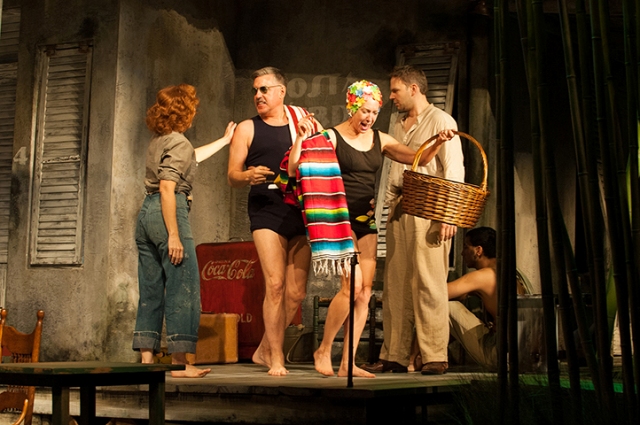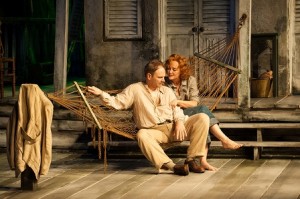The Resident Ensemble Players (REP) performing on the campus of the University of Delaware have started their sixth season with an ambitious undertaking. With an experienced guest director, Ed Stern, and a solid acting company known to the audience to be multi-talented, REP succeeded in bringing the audience into the dismal, rustic life at the Costa Verde hotel in Puerto Vallarta, Mexico. Enter the morally bereft characters of NIGHT OF THE IGUANA written by Tennessee Williams and first produced in 1961.
Tennessee Williams is an American theatrical icon. He holds a revered place as a master of dysfunctional people, struggling in rural, isolated areas who try to overcome the failures and unmet goals of their various lives. A play by Tennessee Williams will not bring one cheer or have one leave laughing. They are studies of the human condition in which the dark side of life is winning. NIGHT OF THE IGUANA is no exception. Stern establishes the ambiance of this production with a languorous design nestled in rain forest bamboo by Joseph P. Tilford. As anyone who summers at the beach is aware, constant exposure to dampness in the forms of humidity and rain, takes it toll on wooden structures. It is easy to imagine the creaking floors and the feel of spongy wood under bare feet. Water is both the cause and relief of the oppressiveness of life at the Costa Verde. Swimming serves both as recreation for the German guests who are celebrating the way World War II is going currently and also a failure at cleansing and redemption. REP presented the 1940’s wartime era through period costumes well executed by Matthew LeFebvre and Tilford’s attention to the details of the Coca-Cola cooler and sound of the telephone.
In the midst of this sweltering jungle, characters are introduced striving to overcome past mistakes and to make a better future. In other plays these characters might have stood a chance for happiness. Williams did not write NIGHT OF THE IGUANA that way. These are tormented souls … these are desperate people … these are human beings encumbered by their own weaknesses, wanting more and failing to achieve it.
The REP performances as an ensemble worked well. Each role is well defined (kudos to Stern), each actor is comfortable with their role and with each other. Even the least seen characters played their roles with effect and believability. Mic Matarrese’s very physical interpretation of Reverend T. Lawrence Shannon leaves one breathless but also a little lost. Ranting was chosen as Shannon’s means of communication. That choice is valid, but it does leave the audience unable to see nuances and changes caused by other characters. Hannah Jelkes, played with stoicism and true British stiff upper lip by Carine Montbertrand, is more emotionally available but still does not reasonate with the buried passion and acceptance of the inevitable which defines Hannah. Elizabeth Heflin, as Maxine Faulk, is the first character we see; and Heflin gives her role a solid, earthy, sensual, needy and consistent composition that holds her in good stead as the story unfolds. Whether she is welcoming or consoling Shannon, fearing or upbraiding Hannah or interacting with others, Maxine knows what she wants and works to get it.
REP does credit to this difficult and lengthy Tennessee Williams work. The myriad moral themes and conflicts are presented although some are more obvious than others due to the decisions made by Stern with this cast. It is a viable production which holds your attention. Human analysts will find much to consider when leaving the theatre; others will have been entertained with a quality production done with competence.
NIGHT OF THE IGUANA
Written by Tennessee Williams
Directed by Ed Stern
September 26 – October 13, 2013
Resident Ensemble Players
Roselle Center for the Arts
110 Orchard Road
Newark, DE 19716
Box Office: 302-831-2204
http://www.pttp.udel.edu



